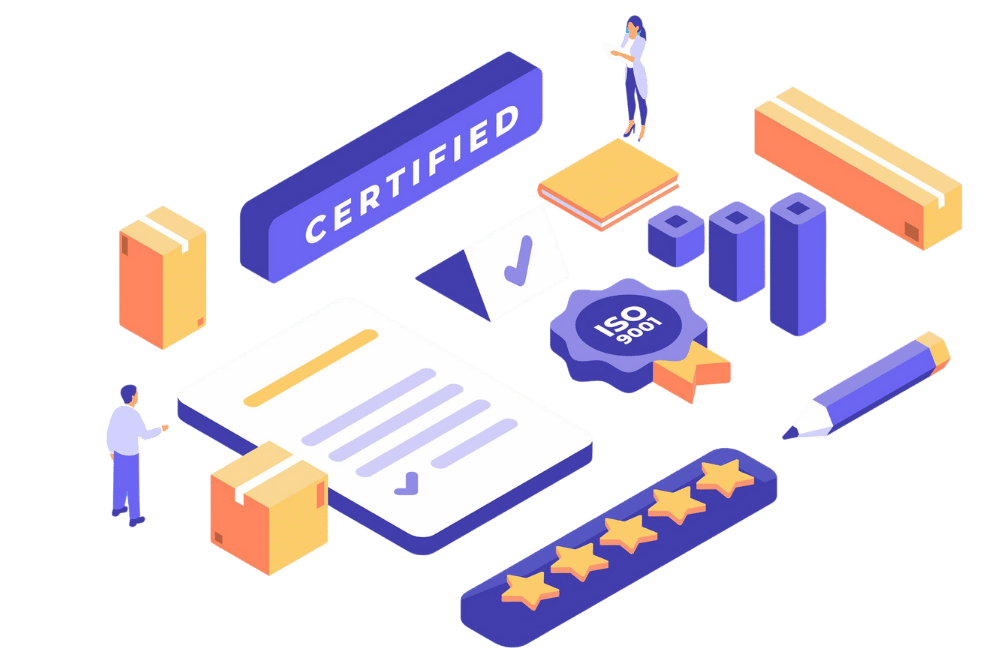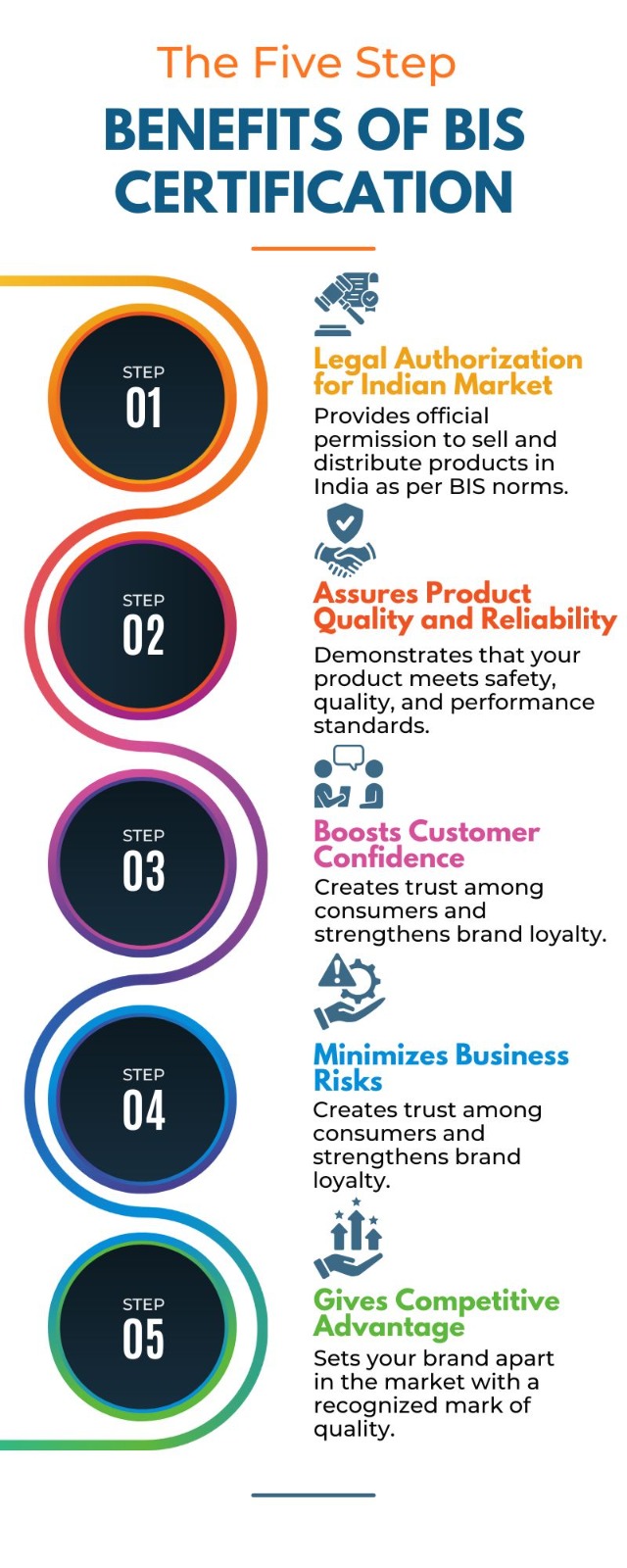Get A Quote
ISO Certification
Want to enhance product quality, streamline processes, and boost customer satisfaction? ISO Certification can help. With ISO, you’ll improve efficiency, build customer trust, increase competitiveness, and reduce costs across your business. Get certified with EVTL India, a leading ISO consultant in India, offering seamless guidance throughout the certification process.

ISO Certification - Overview
ISO certification is a formal recognition issued by the International Organization for Standardization (ISO) to companies and organizations that adhere to globally recognized standards in their operations. It demonstrates that an organization meets international standards in its respective industry, be it in management, safety, quality, or sustainability.

These standards ensure consistency, efficiency, and customer satisfaction across various sectors worldwide. ISO certification is voluntary but highly beneficial as it signifies compliance with standards and enhances an organization’s credibility in the global marketplace. With over 24,000 standards, ISO provides guidelines for almost every industry, helping businesses to improve efficiency, meet regulatory requirements, and stay competitive.
Benefits of ISO Certification
ISO certification provides numerous benefits, making it highly sought-after by organizations across different industries. Some of the main advantages include:
- Enhanced Reputation: An ISO-certified organization is perceived as a reliable and reputable entity. The certification acts as a mark of quality, instilling confidence in clients and stakeholders.
- Improved Efficiency: ISO standards help streamline processes by identifying inefficiencies and promoting best practices, leading to reduced waste, fewer errors, and optimized resource usage.
- Global Competitiveness: Being ISO certified allows organizations to compete on a global scale. Many international business contracts require suppliers or partners to have ISO certification, making it easier for certified companies to expand their market reach.
- Risk Management: ISO standards, particularly those related to risk management and cybersecurity, help organizations identify and mitigate risks, protecting against potential operational, legal, or security issues.
- Regulatory Compliance: ISO certification helps organizations meet local and international regulatory requirements, reducing the risk of legal issues and penalties.
- Customer Satisfaction: By adhering to ISO standards, companies can consistently meet or exceed customer expectations, leading to higher satisfaction and loyalty.
- Employee Morale: ISO certification involves improving organizational processes and structures, which often leads to better working conditions, more defined roles, and enhanced employee satisfaction.
Types of ISO Certifications
ISO offers a wide range of certifications, each addressing specific areas of industry standards. Below is a table that highlights some key ISO certifications across various sectors:
| Industry | Standard | Description |
|---|---|---|
| IT & Related Technologies | ISO/IEC 20000-1:2018 | Service management system requirements for IT services |
| ISO/IEC 23894:2023 | Guidance on risk management in AI technology | |
| ISO/IEC 27017:2015 | Security techniques for cloud services based on ISO/IEC 27002 | |
| ISO/IEC 23894:2023 | Guidance on managing information security risks | |
| ISO/IEC 27001:2022 | Information security management systems | |
| ISO/IEC 27002:2022 | Information security controls | |
| Health Standards | ISO 14971:2019 | Application of risk management to medical devices |
| ISO 14644-12:2018 | Specifications for monitoring air cleanliness in controlled environments | |
| ISO 7101:2023 | Management systems for quality in healthcare organizations | |
| ISO 14155:2020 | Good clinical practice for medical device investigations | |
| ISO 15189:2022 | Requirements for quality and competence in medical laboratories | |
| IEC 62304:2006 | Medical device software life cycle processes | |
| Transport Standards | ISO 16232:2018 | Cleanliness of components in road vehicles |
| ISO 34503:2023 | Test scenarios for automated driving systems | |
| ISO 22163:2023 | Quality management for the railway sector | |
| ISO 10605:2023 | Test methods for electrical disturbances from electrostatic discharge in road vehicles | |
| ISO 21448:2022 | Safety of the intended functionality in road vehicles | |
| ISO/SAE 21434:2021 | Cybersecurity engineering for road vehicles | |
| Management & Services | ISO 9000:2015 | Fundamentals and vocabulary for quality management systems |
| ISO 9001:2015 | Quality management system requirements | |
| ISO/TS 37008:2023 | Guidance on internal investigations for organizations | |
| Environmental Sustainability | ISO 59020:2024 | Measuring and assessing circularity performance in the circular economy |
| ISO 7704:2023 | Requirements for performance testing of membrane filters for microorganism enumeration | |
| ISO 14001:2015 | Environmental management system requirements | |
| Energy Standards | ISO 50001:2018 | Energy management system requirements |
| ISO 8217:2024 | Specifications for marine fuels from petroleum and renewable sources | |
| ISO/PAS 23263:2019 | Considerations for marine fuel quality and sulfur content | |
| Security, Safety & Risk | ISO 18385:2016 | Minimizing human DNA contamination in forensic product manufacturing |
| ISO 22301:2019 | Business continuity management system requirements | |
| ISO 17842-1:2023 | Safety standards for amusement rides and devices |
ISO Certification Process in India
The process of obtaining ISO certification in India involves several critical steps that organizations must follow to ensure compliance with the chosen ISO standards:

Step-1: Make an Application: Once the organization selects an appropriate ISO standard, it must apply through a certified ISO registrar. The application outlines the responsibilities of both the organization and the certification body, including liability, confidentiality, and access rights.

Step-2: Documents Review by Registrar: The certification body reviews quality manuals and documents related to the organization's policies and procedures. This review helps to identify potential gaps that must be addressed.

Step 3: Pre-assessment Needs: The registrar conducts a pre-assessment to identify weaknesses in the quality management system. This step allows the organization to address any deficiencies before the final audit.

Step 4: Prepare an Action Plan: If any gaps are identified, the organization must prepare an action plan to resolve these issues. This often involves training employees to ensure the quality management system meets ISO standards.

Step 5: Onsite Inspection or Audit: An onsite audit is conducted to verify the changes made in the organization. Any discrepancies or non-conformities are categorized as minor or major based on their severity.

Step 6: Final Audit: After all non-conformities have been addressed, the final audit is conducted. If the organization passes, the ISO certification is granted.

Step 7: Surveillance Audits: Periodic audits are conducted to ensure the organization continues to meet ISO standards.
Applicable Fee for ISO Certification in India
The cost of ISO certification in India varies based on several factors, including the organization's size, number of employees, processes, risk level, and the complexity of the management system. The certification body calculates the fee after considering these parameters.
How EVTL India Can Help You Obtain ISO Certification Hassle-Free?
EVTL India provides expert guidance throughout the ISO certification process. Our team offers personalized assistance with document preparation, action plan development, and audit management, ensuring a smooth certification journey. We also provide employee training and ongoing support to maintain ISO standards, helping organizations achieve and sustain certification effortlessly.
Frequently Asked Questions (FAQ)
Our Services
News & Updates









